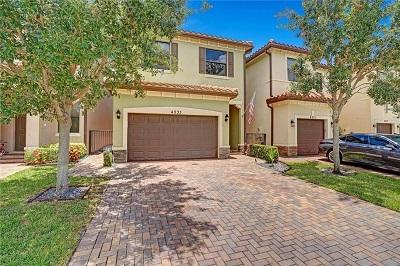Can a Fiancé or Kids be on a VA Loan?
Understanding Who Can Be on a VA Home Loan
One of the biggest benefits available to active duty service members, veterans, and certain members of the National Guard and Reserves is the VA home loan program. While the program offers an amazing benefit including no down payment requirement, no private mortgage insurance among other positive features, the Department of Veterans Affairs has certain restrictions. Some of these cover who can and cannot be o on a VA loan.
For many service members and veterans, buying a home isn’t a solo decision. It is common to want to purchase a property with a loved one which could be a spouse, fiancé, child, or another family member. However, VA underwriting rules do not give complete freedom in choosing co-borrowers. The rules about who can be on the loan are clear, and understanding them upfront can save time, frustration, and potentially the disappointment of a declined loan application.
The VA’s Position on Co-Borrowers
At its core, the VA loan program is designed to benefit eligible service members and veterans. When the VA guarantees a loan, it is taking on some of the risk to the lender. Because of the VA's guarantee on the loan, the VA has restrictions on who can share responsibility for the loan.
If you are married, your legal spouse can be on the loan with you. The spouse does not have to be a veteran. The spouse does not have to be active duty. In fact the spouse does not need to even have a job nor income. With the VA loan, a legal spouse is allowed to be on the loan. This is one of the most common scenarios.
When a Fiancé Wants to Be on the Loan
Many buyers assume that because they are in a committed relationship, their fiancé can automatically be included as a co-borrower. Unfortunately, the VA doesn’t see it that way. Under current guidelines, a fiancé can only be added as a co-borrower if you are legally married before the loan closes.
This rule often becomes a point of discussion during the homebuying process. For example, imagine a veteran and their fiancé find their dream home. They plan to get married in six months, but want to buy the home now. If both incomes are needed to qualify for the loan, they will run into a roadblock as the VA will not approve a joint application between a veteran and a non-spouse who is not a veteran. The options in this case are to either move the wedding up so the marriage occurs before closing, or only have the veteran on the loan.
We have seen this scenario many times and it can be a point of discussion. Some couples will go to the court house or do what they can to speed up the date for their legal marriage. This can certainly help if they both want and/or need to be loan. As many couples are ready for their next chapter together, they often do want to be on the home loan together.
In some cases, couples have been together for many years and have no intention of getting legally married. If they need the income from both individuals, there will be times where we consider another home loan option for them other than the VA loan to help accomplish their goal of becoming homeowners.
If an individual or couple purchased a home with another program, FHA as an example, which does not have the same restriction, they can always refinance at a later time to a VA loan if the scenario changed and if there was a benefit to the couple. For example, a FHA loan has mortgage insurance where a VA loan does not. If a veteran wasn't married and wanted to buy the house now, but couldn't add his or her fiancé to the VA loan, they may proceed with a FHA loan together. If they get married a year later, they may want to consider refinancing in the near future to get rid of the mortgage insurance. Now, they own the house, have been building equity and can can consider refinancing to the VA loan which could have some additional benefits. We have seen many of these scenarios as sometimes the road to homeownership has a different path based on the elements in the scenario.
Buying with Children or Other Relatives
A similar rule applies when a veteran wants to buy a home with their child, parent, or another relative. If the relative is not a legal spouse and is not a veteran with VA eligibility, they generally cannot be on the loan.
However, there is an important exception: if the family member is also a veteran or active duty service member who has their own VA loan entitlement, they can be included on the loan with you. In this case, both borrowers’ entitlements may be used.
Let’s consider another example. Suppose a retired Army veteran wants to purchase a home with her adult son. If the son is not in the military and has no VA eligibility, he cannot be added to the VA loan as a co-borrower. If, however, he is a Marine Corps veteran with his own VA entitlement, they could apply together under VA guidelines.
Why These Rules Exist
The VA’s co-borrower rules aren’t arbitrary. They are rooted in how the VA guarantees the loan and manages risk. When the VA backs a mortgage, it’s essentially promising the lender that it will cover a portion of the loss if the borrower defaults. This guarantee is meant to serve the people who earned the benefit through military service, and extending it to non-eligible individuals would dilute the program’s focus and potentially increase risk to the VA and taxpayers.
By allowing spouses to be co-borrowers, the VA acknowledges that marriage often involves shared finances and mutual legal obligations. The same legal protections and responsibilities that apply in marriage do not automatically extend to other relationships, which is why engaged couples or family members without VA eligibility are treated differently.
Options for Non-Eligible Co-Borrowers
If you are in a situation where you want to buy a home with someone who isn’t eligible to be on your VA loan, you’re not without options—it just requires some planning.
One approach is to have only the eligible veteran or service member on the VA loan. The other person could still be on the property’s title, depending on state laws and lender policies, even if they aren’t financially obligated on the mortgage. This setup can work if the veteran’s income and credit are sufficient to qualify for the loan on their own.
Another option is to explore a conventional or FHA loan instead of a VA loan. These programs have different co-borrower rules and may allow you to buy jointly with a fiancé, child, or other relative without VA eligibility. Of course, you’d be giving up some of the VA loan benefits, so it’s important to weigh the trade-offs carefully.
The Importance of Early Conversations
Many of the challenges in these scenarios can be avoided with early, honest discussions about the VA loan’s co-borrower requirements. If you are thinking about buying a home with someone who isn’t your legal spouse and isn’t a veteran, talk to your lender early in the process. A good loan officer who understands VA guidelines can walk you through the specifics and help you explore the best options for your situation.
It’s also wise to consider the timing of your purchase. If marriage is in the near future and both incomes are needed to qualify, moving the wedding date ahead of closing might make sense. In other cases, it might be worth structuring the loan in one borrower’s name and revisiting joint ownership later.
The VA loan program is an amazing program for those who have served, but like any benefit, it comes with rules and boundaries. Knowing who can, and cannot, be on your VA loan from the start can save you from headaches down the road. Whether you’re buying with a spouse, considering a purchase with your fiancé, or thinking about a joint purchase with your child or another relative, understanding the VA’s co-borrower guidelines is essential to making informed decisions.
The homebuying process has enough moving parts as it is. By clarifying these details early, you’ll be in a stronger position to move forward with confidence and keep the focus where it belongs which is finding the home that is right for you.
Mortgage Insight:
Purchasing a Home with a Conventional Loan
VA Loan Success Story with Eric and Denise
How a VA Loan in Ocala, FL changed a Family's Financial Future
Can I Use My VA Loan in a Chapter 13 Bankruptcy?
Can a Fiance or Kids be on a VA Loan?
Veterans Who Buy Homes See Far Higher Net Worth Than Renters
How Much Mortgage Insurance Can I Save with a VA Loan?
What to Avoid in a Home When Obtaining a VA Loan Appraisal?
Duplex Property in Fort Lauderdale Quadruples in Value and Leaves a Nest Egg to the Heirs
How a California Remote Worker Obtained a Mortgage to Relocate to Boca Raton, FL
What's the Average Mortgage in Fort Lauderdale, FL?
What Factors are in my Credit Score for a Mortgage?
What Documents Do You Need for a No Income Verification Mortgage?
Restaurant Owner Obtains Self-Employed Home Loan
Can a General Contractor Obtain a No Income Verification Mortgage?
Is a HELOC or a Cash Out Refinance Better to Pay for a New Roof?
Can a Collection Prevent Me from Getting a Mortgage?
Do I Have to Make Mortgage Payments if I Lose My Job?

Your mortgage journey.
Various loan type options including:
Conventional loan
FHA loan
VA loan
Self-employed loan options
No income verification for investors
Benefits of Homeownership
Homeownership is a significant milestone and a decision that offers many advantages. In addition to providing a place to call your own, owning a home brings financial stability, personal fulfillment, and a sense of belonging. Mortgage Group has been helping individuals and families obtain homeownership, guiding them through the process and obtaining referrals to help their family and friends accomplish the same.

Purchase
Get pre-approved to purchase your first home, second home or upcoming investment property.
Refinance
Own a property and interested in lowering your payment? Need to take cash out? Refinance with confidence.
Connect with Us
Our experienced team with be happy to speak with you, and walk you through each step of the process.

Providing mortgage solutions to help you with your home.
Mortgages can be complicated and have many moving parts. Let our team help you!
Contact Us
It only takes a few moments to reach out and have an initial conversation.
Know the Next Steps
Our team will work with you to find the best way to achieve your home loan goals.
Find Your Home and Get Your Loan
Our team will be prepared to move with the next steps once you have secured your home purchase contract.
Houses

Townhomes

Condos

Multi-Units

Read helpful information to assist you with obtaining a mortgage.
How Much Home Can I Afford with a VA Loan?

Contact our team today.
1-800-583-5305
© Copyright 2026 E Mortgage Capital, Inc.. All rights reserved.
- 1416824 | E Mortgage Capital, Inc.
Notice To Texas Loan Applicants: Consumers wishing to file a complaint against a mortgage banker, or a licensed mortgage banker residential mortgage loan originator, should complete and send a complaint form to the Texas Department of Savings and Mortgage Lending, 2601 North Lamar, Suite 201, Austin, TX 78705. Complaint forms and instructions may be obtained from the department’s website at www.sml.texas.gov
A toll-free consumer hotline is available at 1-877-276-5550. The department maintains a recovery fund to make payments of certain actual out of pocket damages sustained by borrowers caused by acts of licensed mortgage banker residential mortgage loan originators. A written application for reimbursement from the recovery fund must be filed with and investigated by the department prior to the payment of a claim. For more information about the recovery fund, please consult the department’s website at
www.sml.texas.gov


